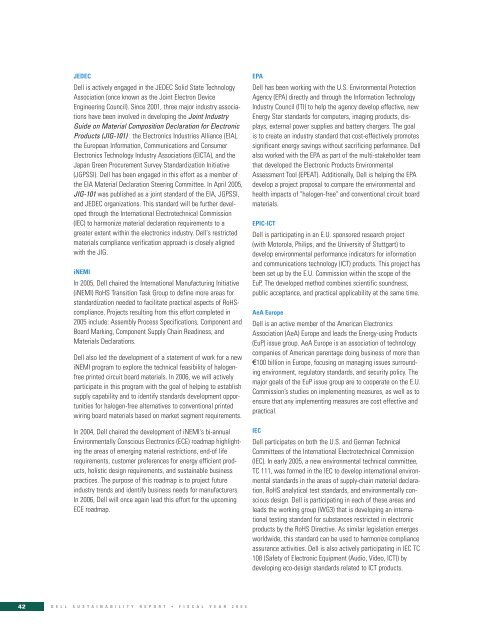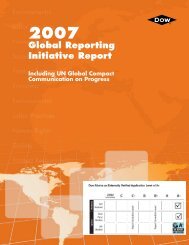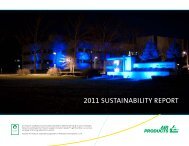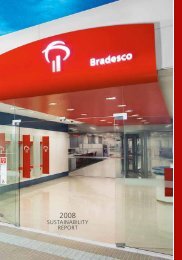Sustainability Report - Dell
Sustainability Report - Dell
Sustainability Report - Dell
Create successful ePaper yourself
Turn your PDF publications into a flip-book with our unique Google optimized e-Paper software.
JEDEC<strong>Dell</strong> is actively engaged in the JEDEC Solid State TechnologyAssociation (once known as the Joint Electron DeviceEngineering Council). Since 2001, three major industry associationshave been involved in developing the Joint IndustryGuide on Material Composition Declaration for ElectronicProducts (JIG-101) : the Electronics Industries Alliance (EIA),the European Information, Communications and ConsumerElectronics Technology Industry Associations (EICTA), and theJapan Green Procurement Survey Standardization Initiative(JGPSSI). <strong>Dell</strong> has been engaged in this effort as a member ofthe EIA Material Declaration Steering Committee. In April 2005,JIG-101 was published as a joint standard of the EIA, JGPSSI,and JEDEC organizations. This standard will be further developedthrough the International Electrotechnical Commission(IEC) to harmonize material declaration requirements to agreater extent within the electronics industry. <strong>Dell</strong>'s restrictedmaterials compliance verification approach is closely alignedwith the JIG.iNEMIIn 2005, <strong>Dell</strong> chaired the International Manufacturing Initiative(iNEMI) RoHS Transition Task Group to define more areas forstandardization needed to facilitate practical aspects of RoHScompliance.Projects resulting from this effort completed in2005 include: Assembly Process Specifications, Component andBoard Marking, Component Supply Chain Readiness, andMaterials Declarations.<strong>Dell</strong> also led the development of a statement of work for a newiNEMI program to explore the technical feasibility of halogenfreeprinted circuit board materials. In 2006, we will activelyparticipate in this program with the goal of helping to establishsupply capability and to identify standards development opportunitiesfor halogen-free alternatives to conventional printedwiring board materials based on market segment requirements.In 2004, <strong>Dell</strong> chaired the development of iNEMI's bi-annualEnvironmentally Conscious Electronics (ECE) roadmap highlightingthe areas of emerging material restrictions, end-of liferequirements, customer preferences for energy efficient products,holistic design requirements, and sustainable businesspractices. The purpose of this roadmap is to project futureindustry trends and identify business needs for manufacturers.In 2006, <strong>Dell</strong> will once again lead this effort for the upcomingECE roadmap.EPA<strong>Dell</strong> has been working with the U.S. Environmental ProtectionAgency (EPA) directly and through the Information TechnologyIndustry Council (ITI) to help the agency develop effective, newEnergy Star standards for computers, imaging products, displays,external power supplies and battery chargers. The goalis to create an industry standard that cost-effectively promotessignificant energy savings without sacrificing performance. <strong>Dell</strong>also worked with the EPA as part of the multi-stakeholder teamthat developed the Electronic Products EnvironmentalAssessment Tool (EPEAT). Additionally, <strong>Dell</strong> is helping the EPAdevelop a project proposal to compare the environmental andhealth impacts of "halogen-free" and conventional circuit boardmaterials.EPIC-ICT<strong>Dell</strong> is participating in an E.U. sponsored research project(with Motorola, Philips, and the University of Stuttgart) todevelop environmental performance indicators for informationand communications technology (ICT) products. This project hasbeen set up by the E.U. Commission within the scope of theEuP. The developed method combines scientific soundness,public acceptance, and practical applicability at the same time.AeA Europe<strong>Dell</strong> is an active member of the American ElectronicsAssociation (AeA) Europe and leads the Energy-using Products(EuP) issue group. AeA Europe is an association of technologycompanies of American parentage doing business of more than€100 billion in Europe, focusing on managing issues surroundingenvironment, regulatory standards, and security policy. Themajor goals of the EuP issue group are to cooperate on the E.U.Commission’s studies on implementing measures, as well as toensure that any implementing measures are cost effective andpractical.IEC<strong>Dell</strong> participates on both the U.S. and German TechnicalCommittees of the International Electrotechnical Commission(IEC). In early 2005, a new environmental technical committee,TC 111, was formed in the IEC to develop international environmentalstandards in the areas of supply-chain material declaration,RoHS analytical test standards, and environmentally consciousdesign. <strong>Dell</strong> is participating in each of these areas andleads the working group (WG3) that is developing an internationaltesting standard for substances restricted in electronicproducts by the RoHS Directive. As similar legislation emergesworldwide, this standard can be used to harmonize complianceassurance activities. <strong>Dell</strong> is also actively participating in IEC TC108 (Safety of Electronic Equipment (Audio, Video, ICT)) bydeveloping eco-design standards related to ICT products.42 D E L L S U S T A I N A B I L I T Y R E P O R T • F I S C A L Y E A R 2 0 0 6
















